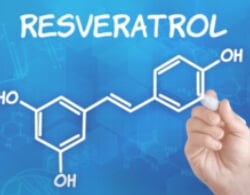Resveratrol Immune System studies:
Resveratrol is commonly first described as a natural plant extract that is used as an anti-Cancer, cardioprotective, or anti-aging therapy. However, resveratrol does much more for our health than just treating these three types of ailments. When resveratrol was first discovered, it was categorized as a phytoalexin, a compound used by plants as a chemical defense against Infections and stress. It is now clear that these protective properties meant for plants also benefit humans, although the exact mechanism(s) remain unknown. Previous research has shown that resveratrol inhibits certain components of the immune response, which under certain conditions, can enhance our wellbeing. [1]
For example, if a person is suffering from an Autoimmune disease or certain forms of Arthritis, resveratrol has been shown to alleviate these conditions by decreasing the immune response. This month two papers were published that report dual functions of resveratrol on the immune system. [2]
Resveratrol immune system studies: Enhancement Study
The first article involved in the latest resveratrol immune system studies includes a group of researchers from Austria who wanted to address whether some cells within the immune response, specifically cells that fight bacterial Infections, are also inhibited by resveratrol (Biochimica et Biophysica Acta General Subjects, September 2013). The researchers in this first part of the resveratrol immune system studies took 10 volunteers and measured the amount of certain key hormones, in particular, TNF-alpha and IL-10, after taking 5 g of resveratrol. They also were able to confirm their results by using human cell lines that simulate what happens within our body in the laboratory setting. So what did they observe? The results demonstrated that the individuals had increased levels of TNF-alpha in monocyte cells from their blood after the cells were stimulated with bacteria. Suggesting then that the Antibacterial properties of the cells are boosted by resveratrol. It is also interesting to note that higher levels of TNF-alpha have been linked to other human diseases such as Alzheimer’s and Cancer. Suggesting that the immune cells, when activated with resveratrol, could indirectly be aiding these afflictions. This resveratrol discovery brings into light that resveratrol can enhance, not just inhibit, the immune response in a method that overall can lead to increased health. These results point yet again to additional remarkable properties of this plant compound. [3]
Resveratrol immune system studies: Inhibition Study
The second article in the resveratrol immune system studies investigates the sirtuin signals that inhibit T cells from becoming active (PLOS ONE, September 2013). Several papers have shown that resveratrol can inhibit inflammatory responses. However, the mechanism for how this happens has eluded scientists. In this article, the researchers demonstrate that the resveratrol inhibitory mechanism works by using sirtuins for the first time. Sirtuins are a family of proteins that regulate other molecules by modifying them and turning them off or on. To demonstrate the importance of resveratrol in the resveratrol immune system studies to turn off the immune response, the authors took genetically modified mice that developed rheumatoid Arthritis and administered resveratrol for two months. The results were very positive; the treated mice had a significantly reduced disease incidence. The results from both papers are encouraging, but they beg the question, how does resveratrol function in what appear to be conflicting mechanisms? No one knows for certain, but it is safe to say that further experimental research is needed to resolve this question. [4]
References:
- https://www.sciencedirect.com/science/article/pii/S1466856409000745
- https://www.mdpi.com/452382
- https://europepmc.org/article/med/16982457
- https://journals.plos.org/plosone/article?id=10.1371/journal.pone.0075139








